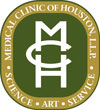Proper hydration is essential for maintaining overall health and well-being. Water makes up about 60% of our body weight and is crucial for various bodily functions, including temperature regulation, joint lubrication, and nutrient transport. Internists, who specialize in internal medicine, emphasize the importance of staying hydrated and offer practical tips to help patients maintain adequate hydration. At the Medical Clinic of Houston, our internal medicine doctors in Houston, TX provide expert guidance on how to stay hydrated and the benefits of proper hydration. Here’s why hydration is so important and how you can ensure you’re getting enough fluids.
The Benefits of Proper Hydration
1. Regulates Body Temperature
Water helps regulate body temperature through sweating and respiration. Proper hydration ensures that your body can efficiently cool down during exercise and hot weather, preventing heat-related illnesses.
2. Supports Digestion and Nutrient Absorption
Water is vital for digestion and nutrient absorption. It helps break down food, allowing your body to absorb essential nutrients. Proper hydration also prevents constipation and promotes regular bowel movements.
3. Maintains Joint and Muscle Function
Adequate hydration keeps joints lubricated and muscles functioning properly. This is particularly important for physical activity, as dehydration can lead to muscle cramps and joint pain.
4. Enhances Cognitive Function
Even mild dehydration can affect cognitive function, leading to difficulties in concentration, memory, and mood. Staying hydrated supports brain function and mental clarity.
5. Promotes Cardiovascular Health
Water is crucial for maintaining blood volume and circulation. Proper hydration ensures that your heart doesn’t have to work as hard to pump blood, reducing the risk of cardiovascular strain and related health issues.
6. Improves Skin Health
Hydration plays a significant role in maintaining healthy skin. Proper hydration helps keep your skin moisturized, reducing dryness and the appearance of fine lines and wrinkles.
Tips for Maintaining Proper Hydration
1. Drink Plenty of Water
The simplest way to stay hydrated is to drink plenty of water throughout the day. Internists recommend drinking at least 8-10 glasses of water daily, though individual needs may vary based on factors such as age, weight, activity level, and climate.
2. Eat Water-Rich Foods
Incorporate water-rich foods into your diet, such as fruits and vegetables. Foods like cucumbers, watermelon, oranges, and strawberries have high water content and can contribute to your daily hydration needs.
3. Monitor Your Hydration Levels
Pay attention to signs of dehydration, such as dark yellow urine, dry mouth, and fatigue. A simple way to monitor hydration is to check the color of your urine; it should be light yellow or clear if you’re adequately hydrated.
4. Stay Hydrated During Physical Activity
Drink water before, during, and after exercise to replace fluids lost through sweating. For intense or prolonged physical activity, consider sports drinks that contain electrolytes to maintain electrolyte balance.
5. Adjust Fluid Intake Based on Environment
Hot and humid weather increases fluid loss through sweating. Be sure to drink more water when you’re in hot climates or engaging in activities that cause you to sweat more.
6. Limit Diuretic Beverages
Limit the intake of diuretic beverages like caffeinated drinks and alcohol, as they can increase fluid loss and contribute to dehydration. If you do consume these beverages, make sure to drink additional water to compensate.
7. Use Reminders
If you have trouble remembering to drink water, use reminders. Set alarms on your phone, use apps designed to track water intake, or keep a water bottle with you at all times to encourage regular sips throughout the day.
The Internist’s Role in Hydration Management in Houston, TX
Internists play a crucial role in educating patients about the importance of hydration and providing personalized advice based on individual health needs. They can help identify underlying conditions that may affect hydration status, such as diabetes or kidney disease, and recommend appropriate fluid intake levels. Regular check-ups with an internist ensure that your hydration needs are met and any potential issues are addressed promptly.
Conclusion
Proper hydration is essential for maintaining optimal health and preventing various health issues. By following the tips provided by internists, you can ensure that you stay adequately hydrated and support your body’s vital functions. The internal medicine doctors at the Medical Clinic of Houston are here to help you achieve and maintain proper hydration for a healthier life.
For expert advice on hydration and overall health, book an appointment with our internists at the Medical Clinic of Houston. Call us today at (713) 526-5511 or visit us at 1701 Sunset Blvd, Houston, TX 77005.
